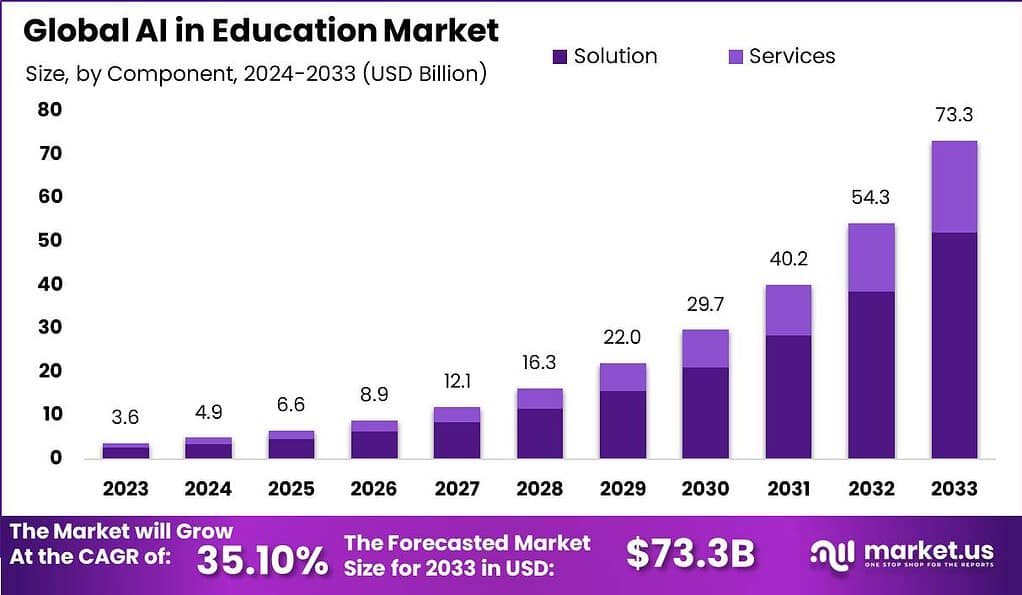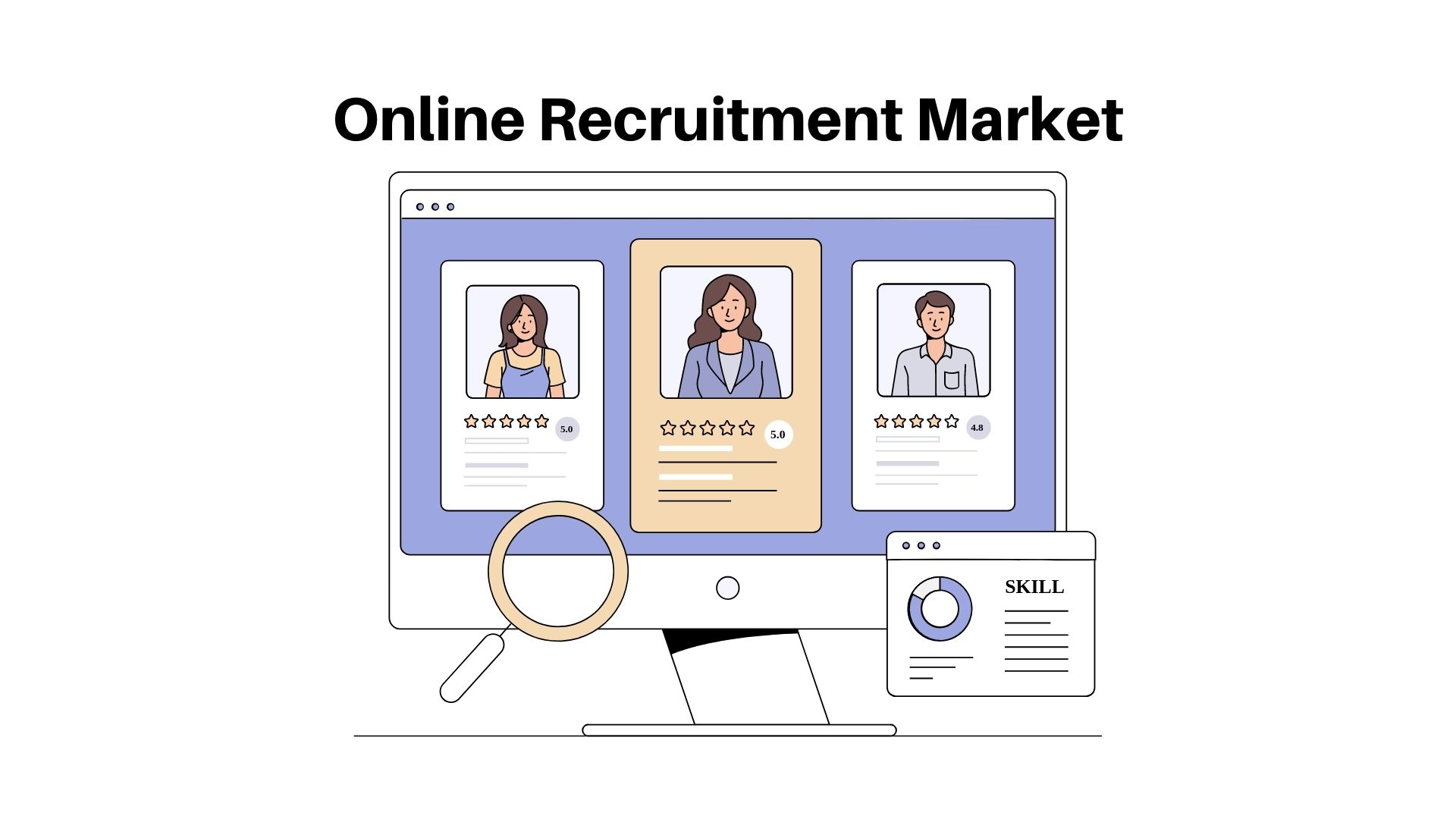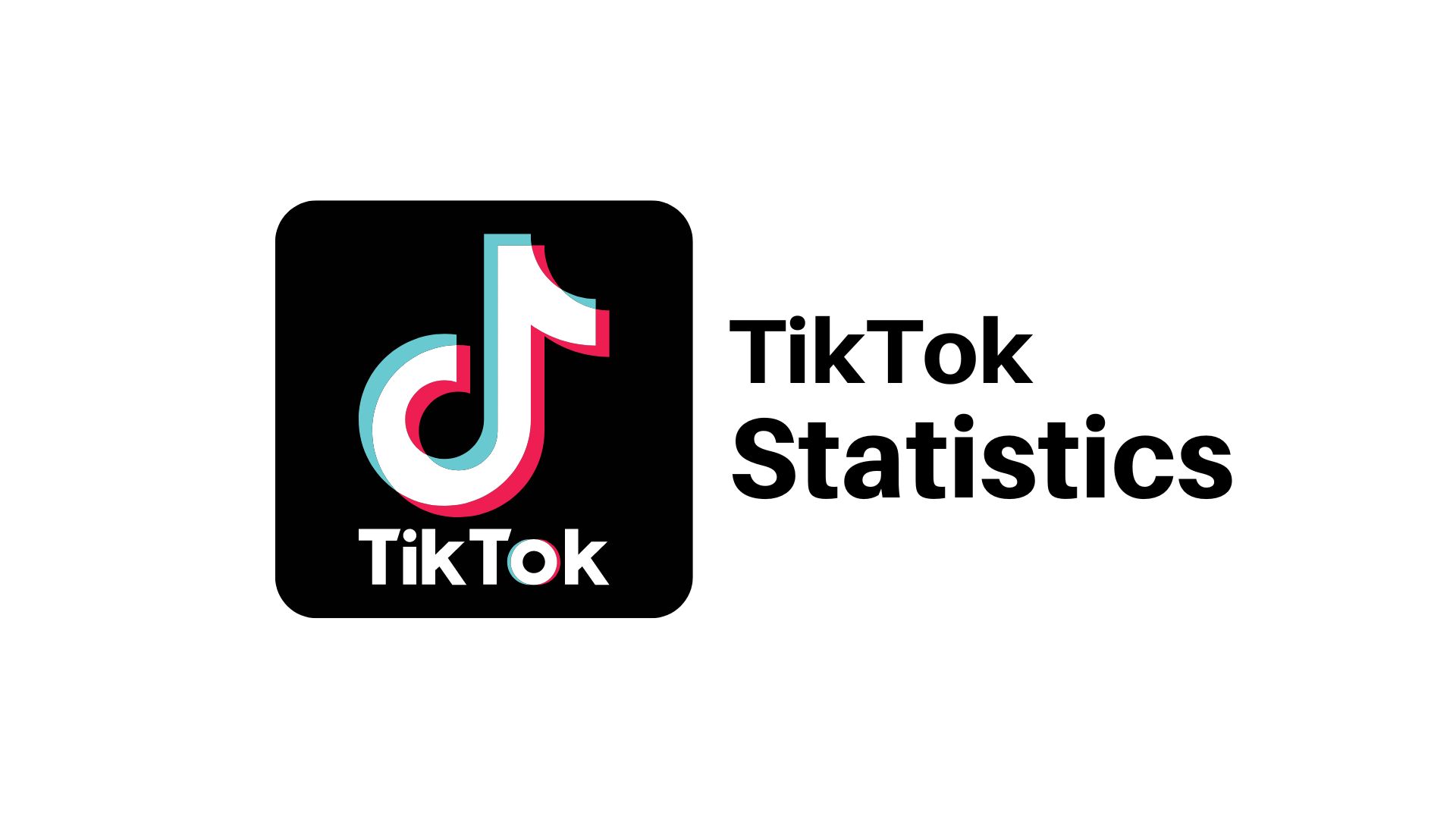AI in Education Market to Reach USD 73.3 billion by 2033 | CAGR of 35.10%

Page Contents
The AI in Education market is poised for substantial growth, with estimations projecting its value to soar to USD 73.3 billion by 2033, reflecting a robust Compound Annual Growth Rate (CAGR) of 35.10%.
AI is making significant advancements in the field of education, transforming the way students learn and teachers teach. With the potential to enhance personalized learning experiences, streamline administrative tasks, and provide valuable insights, AI is revolutionizing education.
In the AI in education market, there is a growing adoption of intelligent tutoring systems that use AI algorithms to provide personalized instruction to students. These systems can adapt to individual learning styles, pace, and needs, offering customized content and feedback. AI-powered virtual assistants and chatbots are also being employed to provide instant support and answer student queries, enhancing engagement and accessibility.
For additional information on the market contribution of each segment – Grab an Exclusive Sample Report

Important Revelation
- Market Growth Projection: The AI in Education market is estimated to reach a substantial value of USD 73.3 billion by 2033, exhibiting a robust Compound Annual Growth Rate (CAGR) of 35.10% throughout the forecast period.
- Investor Confidence: High investor confidence is evidenced by substantial funding rounds, such as Chinese edtech startup Squirrel AI Learning raising $150 million in 2022 at a valuation of $2 billion.
- Enhanced Learning Experiences: Studies suggest that AI-powered tutoring systems can potentially improve student engagement and performance by up to 30%, underlining the positive impact of AI on educational experiences.
- Grading Automation: AI is expected to automate grading for nearly 100% of multiple-choice exams and 50% of essays in higher education by 2024, indicating a shift towards increased efficiency in educational processes.
- Solution Segment Dominance: In 2023, the Solution segment held over 71% of the market share, driven by the adoption of AI-powered solutions offering personalized learning experiences and operational efficiencies.
- Cloud Deployment Preference: Cloud deployment captured more than 56% of the market in 2023, attributed to scalability, flexibility, and cost-efficiency advantages.
- Machine Learning Leadership: Machine Learning held over 60% of the market share in 2023, showcasing its effectiveness in enhancing learning experiences and operational efficiencies.
- Learning Platforms Lead: The Learning Platform and Virtual Facilitators segment dominated with over 46% market share in 2023, owing to the increasing adoption of advanced technologies and demand for personalized learning experiences.
- Higher Education Sector: Held over 42% market share in 2023, driven by the integration of AI solutions for personalized learning, administrative automation, and research activities.
- Regional Dominance: In 2023, North America held a dominant market position in the AI in Education market, capturing more than a 36% share, attributed to robust technological infrastructure and investments in AI by educational institutions.
- Over 60% of the global AI in education market share is expected to be held by the top five providers: IBM, Microsoft, Google, Amazon, and Carnegie Learning.
- The flow of venture capital into AI education startups is projected to exceed $1 billion in 2023, with an increase to $1.5 billion in 2024.
- Funding specifically targeting K-12 solutions is anticipated to reach $800 million in 2024, up from $350 million in 2022.
- Total global investment in AI solutions for universities is forecasted to exceed $3 billion annually by 2024.
- According to Forbes, Google and IBM are expected to invest over $400 million each in developing and marketing AI education technologies like Watson Tutor.
- In China, over 50% of AI education investments will be focused on adult learning and reskilling applications by 2024.
- More than 60% of higher education institutions are anticipated to have implemented AI platforms.
- AI's capability to analyze student engagement and predict dropouts is expected to achieve an accuracy of 80%.
- Personalized learning facilitated by AI tutors is projected to improve outcomes by 35-40%.
- The adoption of intelligent tutoring systems in the K-12 sector is expected to grow, with a projection of 60% by 2025.
- The application of AI in recruitment and admissions processes can potentially reduce bias and increase diversity by 15-20%.
- AI is projected to augment rather than replace teachers, with 95% of educators expected to use AI to enhance learning experiences.
Top 5 Emerging Trends
- Increased Integration of Augmented and Virtual Reality (AR/VR): The integration of AR and VR technologies with AI is providing immersive and interactive learning experiences. This combination enhances engagement and facilitates the simulation of complex concepts, making learning more accessible and engaging.
- Adaptive Learning Platforms: AI-driven adaptive learning platforms are becoming more sophisticated, offering personalized learning experiences at scale. These platforms analyze learners' interactions and performance to tailor content, pace, and learning pathways to meet individual needs, thereby optimizing learning outcomes.
- AI for Educational Content Creation: AI tools are being increasingly used for generating and curating educational content. From automatic generation of quizzes to the creation of customized textbooks, AI is enabling more efficient production of learning materials tailored to specific curricular requirements and learning objectives.
- Blockchain for Education Credentials: The integration of AI with blockchain technology is emerging as a solution for the secure and verifiable issuance of educational credentials. This trend addresses the growing need for a trustworthy system of record for educational achievements that is accessible and verifiable worldwide.
- Emotion AI in Learning: Emotion AI, or affective computing, is gaining traction as a means to gauge and respond to learners' emotional states. By analyzing facial expressions, voice patterns, and learning behaviors, AI can adjust the learning environment to keep students engaged and motivated.
“AI-powered language learning apps and platforms are becoming more sophisticated, offering personalized learning experiences that adapt to the user's proficiency level, learning speed, and preferences. This includes the use of natural language processing (NLP) to improve language learning efficiency and engagement.” Says Yogesh Shinde Team Lead @ Market.us
Regional Analysis
North America's leading position in the AI in Education market, with a commanding share of over 36% and a valuation of US$ 1.3 billion in 2023, can be attributed to several key factors that underscore the region's innovation-driven ecosystem. Firstly, North America, particularly the United States, hosts a robust technological infrastructure and a thriving ecosystem of tech giants and startups alike. Companies such as Google, IBM, and Microsoft, which are pivotal in advancing AI technologies, are headquartered in this region. This proximity to innovators and thought leaders in AI provides a direct channel for educational institutions to integrate the latest AI solutions into their teaching and learning processes.
Furthermore, there is a strong culture of investment and support for educational technology (EdTech) in North America. Venture capital firms and government initiatives actively fund research and development in AI applications for education, driving innovation and adoption. This financial backing not only fuels the development of new technologies but also facilitates the implementation of AI in schools, colleges, and universities at a scale not commonly seen in other regions.

Top Market Leaders
The AI in Education market is a dynamic and rapidly evolving landscape, with key players ranging from established technology giants to innovative startups shaping the future of educational technologies. Nuance Communications, Inc. has carved a niche in voice and language recognition solutions, offering tools that enhance interactive learning and accessibility, thereby contributing significantly to personalized education. International Business Machines Corporation (IBM), with its Watson platform, stands at the forefront of integrating AI into educational content, analytics, and management systems, demonstrating how cognitive technologies can transform the learning experience.
DreamBox Learning, Inc. specializes in adaptive learning technologies for K-12 education, showcasing the potential of AI to tailor learning paths to individual student needs, thus improving mathematical comprehension and outcomes. Cognizant's approach to digital education solutions emphasizes the role of AI in streamlining operations and enhancing learning and teaching methodologies across various educational institutions. Microsoft Corporation, with its vast array of AI tools and platforms, including Azure AI, offers extensive resources for developing and deploying AI solutions in education, fostering collaboration, creativity, and critical thinking among learners.
BridgeU leverages AI to streamline the university and career guidance process, providing students with personalized advice that aligns with their strengths and aspirations. Amazon Web Services, Inc. offers powerful cloud computing resources that enable educational institutions to implement and scale AI solutions efficiently, thus democratizing access to advanced learning technologies. Google LLC's contributions through products like Google Classroom and AI-driven analytics tools emphasize the enhancement of collaboration, efficiency, and personalized learning.
Carnegie Learning, Inc. focuses on innovative, research-based learning technologies for math education, integrating AI to offer adaptive learning environments that respond to individual student progress. Pearson PLC has been instrumental in embedding AI across its digital learning products, aiming to improve outcomes and increase accessibility for learners globally.
Recent Developments
1. Microsoft Corporation:
- July 2023: Microsoft introduced “Microsoft Learn Student Labs,” an innovative AI-powered platform designed to offer personalized learning paths alongside hands-on labs. This initiative aims to assist students in acquiring in-demand technical skills, reflecting Microsoft's commitment to leveraging AI to enhance educational experiences and skill development.
- August 2023: Microsoft announced a significant expansion of its “AI for Accessibility” program. This expansion includes the integration of features such as “Immersive Reader” and “Learning Tools,” which are powered by AI to accommodate diverse learning styles and needs. This move underscores Microsoft's dedication to making education more accessible and inclusive through the application of advanced AI technologies.
2. BridgeU
- In 2023, they may have focused on internal development and improvement of their existing AI-powered tutoring and personalized learning platform.
Conclusion
In conclusion, the integration of AI in education marks a significant milestone in the journey towards more innovative, inclusive, and effective educational systems. By harnessing the power of AI, educators, and learners are equipped with the tools necessary for success in the 21st century, setting the stage for a future where the full spectrum of human potential can be realized through enhanced educational experiences.
The team behind market.us, marketresearch.biz, market.biz and more. Our purpose is to keep our customers ahead of the game with regard to the markets. They may fluctuate up or down, but we will help you to stay ahead of the curve in these market fluctuations. Our consistent growth and ability to deliver in-depth analyses and market insight has engaged genuine market players. They have faith in us to offer the data and information they require to make balanced and decisive marketing decisions.



